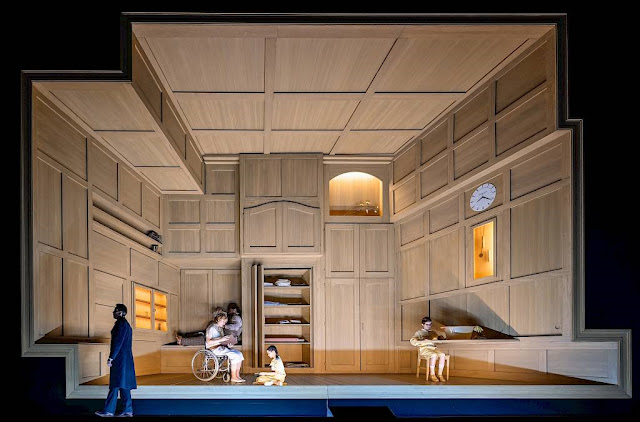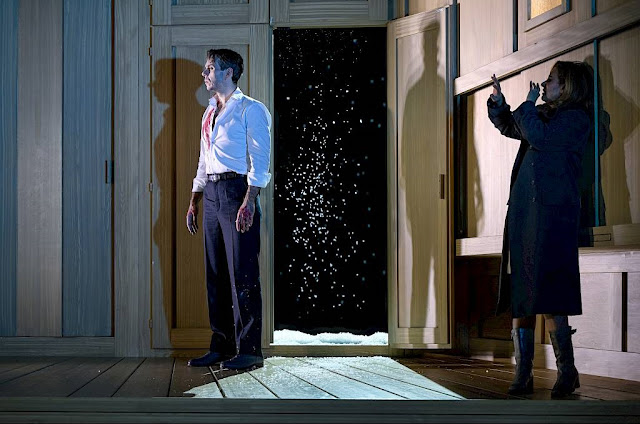 |
| Massenet: Werther - Benjamin Bernheim, Valeriy Murga - Zurich Opera (Photo: Toni Suter) |
Massenet: Werther; Benjamin Bernheim, Rihab Chaieb, Sandra Hamaoui, Audun Iversen, Valeriy Murga, director: Tatjana Gürbaca/Nina Russi, conductor: Giedrė Šlekytė; Zurich Opera
Reviewed 19 January 2024
One of those performances created by people who understood what is needed in Massenet's opera with one of the most finely sung accounts of the title role that I have ever heard. Pure magic
Zurich Opera debuted its production of Massenet's Werther at Zurich Opera House in 2017, directed by Tatjana Gürbaca with Juan Diego Florez in the title role. On Friday 19 January 2024, the production received its first revival (revival director Nina Russi), conducted by Giedrė Šlekytė with Benjamin Bernheim in the title role, Rihab Chaieb making her house debut as Charlotte, Sandra Hamaoui as Sophie, Audun Iversen as Albert and Valeriy Murga as Le Bailli.
Werther has an important Swiss history. Written in 1885, it was rejected by the Opéra Comique in Paris as being too serious. Eventually the work would be premiered in Vienna at the Hofoper in German in 1892. The first performance in the original French was later in 1892 in Geneva, with the first performance in France not happening until 1893 when it was given by the Théâtre Lyrique and it was not until 1903 that the Opéra Comique took the work on.
In Zurich, Klaus Grünberg's set consisted of a single wood panelled box with compartments/cupboards that opened to reveal the necessaries for the plot - dinner things, bread, Albert's pistol, an organ for Act Two, an urn with Charlotte's mother's ashes and so on. Costumes (by Silke Willrett) were roughly modern, however no mobile phones and Le Bailli uses a small portable typewriter.
 |
| Massenet: Werther - Benjamin Bernheim, Rihab Chaib - Zurich Opera (Photo: Toni Suter) |
But there was also a surreal element to the staging in the way the children in Act One would emerge from odd cupboards whilst throughout the evening members of the cast emerged and disappeared through odd panels. For his first entrance, Benjamin Bernheim's Werther emerged along the fore-stage and walked into the dramatic space, whilst his hymn to nature took place whilst he wandered round the stationery members of Le Bailli's family, almost as if Werther had conjured them from his imagination.
The party that Werther and Charlotte were going to in Act One was clearly a livelier affair than either Massenet or his librettists might have envisioned and twice during Act One, the party-goers flooded the stage. It seemed to be a fancy-dress party; Rihab Chaieb's Charlotte wore a fairy coronet and Bernheim's Werther had a feathered head-dress. These continued to have an importance as symbols throughout the opera. At the end of Act Three, whilst Bernheim and Chaieb were passionately duetting, an elderly couple (played by the actors who took the roles of the Pastor and his wife in Act Two) appeared wearing the crown and the head-dress, a symbol of the road not taken, perhaps, or that love was indeed eternal.
In Act Four, the wounded Werther entered by a door left open to reveal the snow falling, except that all the doors and panels opened to reveal that this was part of an image of the spinning cosmos as the Earth itself came into view. Another symbol of the couple's eternal love.
For all the importance of the solo arias in the opera, much if it is set in a form of orchestrally accompanied lyric dialogue and predicated on flexibly delivered, idiomatic text. Massenet's opera are often dependent on the right approach to language. With a cast led by a Francophone tenor, the results were impressive. Throughout the dialogue was clear, expressive and flexible; would that all 19th-century French operas were sung like that.
 |
| Massenet: Werther - Sandra Hamaoui, Benjamin Bernheim, Audun Iversen - Zurich Opera (Photo: Toni Suter) |
Bernheim gave one of the best sung accounts of the title role that I have heard. He has a fine, narrow-gauge voice that gives the music a lovely sense of line, but he can also fine it away to a hushed head voice or cut like a blade. the quiet moments had a lovely aura to them, but he opened up with impressive power.
This Werther was obsessed with Charlotte from the word go. Much of Act One seemed to take place in his head, and Bernheim even managed to make the cries of 'Un autre est son époux!' moving and not risible. The first two acts were very much about the clash between Werther's interior, personal world and cold reality. The surreal elements in the staging helping to emphasise this. In Act Three, Bernheim's declaiming of the Ossian verses was profoundly moving and the dramatic scene with Chaieb's Charlotte was very powerful indeed. The death scene was, thankfully, not realistic and, particularly given the images of the spinning cosmos, not a little mystic too. When Bernheim came to the passage about the two lime trees, his voice bleached of all colour, he had me almost in tears.
Rihab Chaieb matched Bernheim wonderfully. Girlish and young in Act One, as each act progressed we watched her Charlotte mature and Chaieb's voice open out; a truly consummate performance. In Act One, she really felt one of the family yet by the end of the act you felt her pushing against the restrictions, wanting to be more bad girl. And there was the distinct feeling that this Charlotte knowingly led Werther on. In Act Two, looking every inch the married woman, Chaieb's warmly communicative tone gave the lie to the idea that thoughts of Werther were behind her. And Act Three was just devastating with the sequence of the Letter Scene and then 'Va! laisse couler mes larmes', where Chaieb's voice flowered gloriously. By the end of the opera there was poise too, added to the mix. A notable and powerful role assumption.
Both Bernheim and Chaieb had the ability to fill Massenet's vocal lines whilst retaining a sense of flexible line and the idea of text-based drama.
 |
| Massenet: Werther - Rihab Chaieb , Benjamin Bernheim - Zurich Opera (Photo: Toni Suter) |
Sandra Hamaoui made an appealing Sophie, naïve and girlish, with a delightful way with the role's more coloratura moments, but she matured too and Hamaoui really did convey the way Sophie's girlish crush on Werther grew into something more serious. Audun Iversen's Albert began as a rather touching man in love, but his attitude hardened as he became aware of Werther's persistent regard for Charlotte and the sense that the regard wasn't going to go away. Fierce as necessary, Iversen did not glower, instead he created the feel of a decent man in the wrong situation. And for once we didn't need the epithet 'boring Albert'.
Valeriy Murga made Le Bailli a bluff, melancholy man, perhaps more inclined to sit and brood than join his friends. These, Johann and Schmidt (Martin Zysset and Andrew Moore) were the sort of jokesters whose fun had worn out long ago. In Act One they delighted in terrorising the children and in Act Two, the old people in the village. If you had complained, they would have said 'it's only a joke'. Jonas Jud and Flavia Stricker as the Klopstock-obsessed couple made a strong impression. The children were engaging and appealing, solos well taken, part of the drama rather than a cutesy side-show.
As important as the soloists are in the opera, the orchestra has an equal role and from the strong, ominous notes of the beginning of the prelude, we knew Giedrė Šlekytė meant business. She drew a big-boned yet flexible account of the score from the players. There was perhaps scope for even more freedom in her tempi, but she kept things moving whilst allowing the music space to breath and the French dialogue to flow.
 |
| Massenet: Werther - Rihab Chaieb , Benjamin Bernheim - Zurich Opera (Photo: Toni Suter) |
This seemed to be one of those performances created by people who understood what is needed in Massenet's opera. So here we had not just fine singing but flexible drama and towering emotions.
Pure magic
Never miss out on future posts by following us
The blog is free, but I'd be delighted if you were to show your appreciation by buying me a coffee.
Elsewhere on this blog
- Le Piano Symphonique in Lucerne: From large-scale Liszt and Wagner to intimate Schumann and Schubert - concert review
- An evening of bold & adventurous programming: wind & brass from Southbank Sinfonia & Britten Sinfonia combine - concert review
- Le Piano Symphonique in Lucerne: Made in Switzerland, tenor Daniel Behle & pianist Oliver Schnyder combine musicality & intelligence - concert review
- Le Piano Symphonique in Lucerne: From poetic Liszt and Grieg concertos to a little bit of magic from Martha Argerich and friends - concert review
- Eavesdropping on their dramas: Opera North's 'in the round' production Britten's Albert Herring - opera review
- A shelter where people can be sure of quality and find so much to discover: founder Michael Adda on his record label, La Dolce Volta - interview
- Byrd Compared: Phantasm & Anna Prohaska celebrate the consort song - concert review
- Slowly, through a process of osmosis, the piece and I are slowly becoming acquainted: horn player, Ben Goldscheider on Gavin Higgins' new Horn Concerto - guest posting
- At Kings Place this month, Turkish pianist Can Çakmur celebrates the Hamamatsu Competition which he won in 2018, not to mention embarking on his 12-disc Schubert with BIS - interview
- Sheer delight: William Christie & Les Arts Florissants celebrate New Year's Eve at Wigmore Hall in fine style - concert review
- Home

.jpg)









No comments:
Post a Comment